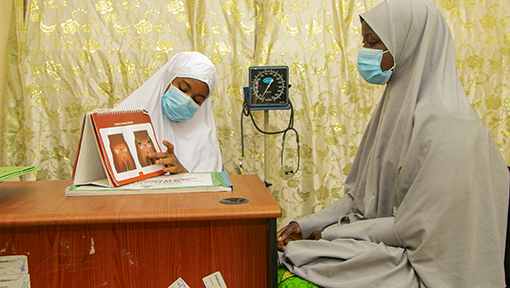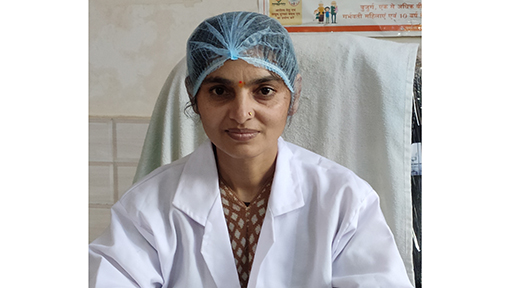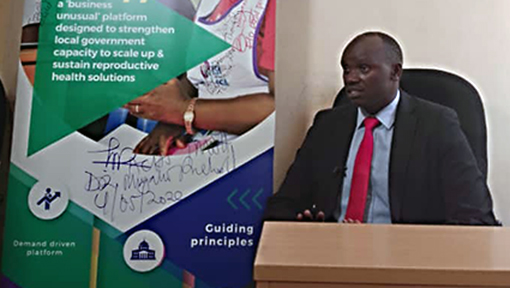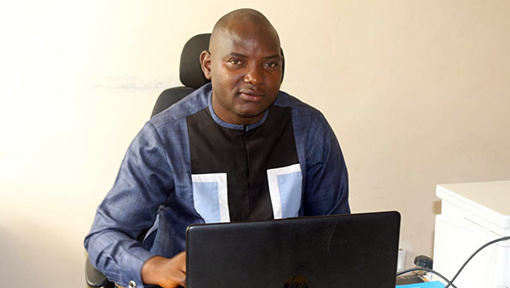Committed Provider Brings Family Planning Services to Doorsteps in Rivers State, Nigeria
Contributor: Dr. Chidinma Owalan
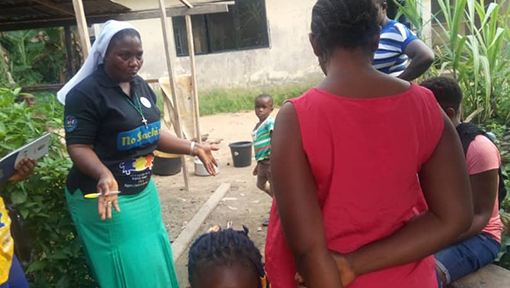 Rev. Sr. Theresa Normakoh is a family planning provider at the Ikodi model primary health center in the Ahoada West local government area (LGA) in Rivers State, Nigeria. She was moved by the plight of women of reproductive age in her community who want to space and limit the number of children they have but are unable to access contraceptive services due to barriers of distance to and cost of transportation to the health facility. So Normakoh took the initiative to bring family planning information and services to the doorsteps of potential clients in her community with the support of TCI. She explains:
Rev. Sr. Theresa Normakoh is a family planning provider at the Ikodi model primary health center in the Ahoada West local government area (LGA) in Rivers State, Nigeria. She was moved by the plight of women of reproductive age in her community who want to space and limit the number of children they have but are unable to access contraceptive services due to barriers of distance to and cost of transportation to the health facility. So Normakoh took the initiative to bring family planning information and services to the doorsteps of potential clients in her community with the support of TCI. She explains:
Before TCI invited us for the training, family planning in the health center had been going on … [but] contact between the facility and the community was not very strong because I was the only one providing family planning in the health center. … When TCI called us for the training [on its proven service delivery approaches] and then got us social mobilizers to assist, the work became a little bit easier with having social mobilizers assisting us in the community. It helped increase my morale. It’s like when you have been fetching water to put in a drum and you are alone. You get tired on the way. The drum is not getting filled. But when you have other hands helping you to fetch, by the time you go just once or twice, you see that the drum is filled. So that was exactly what happened here. With the social mobilizers around, it was like a boost…. So, they gave me the morale to now go into the community and then when we went into the community, it was like teamwork. It was not just an individual work any longer. Now, they hear it from so many mouths saying the same thing. For me, it was an energizing thing. They gave me the courage because at a point, I was ready to give up.”
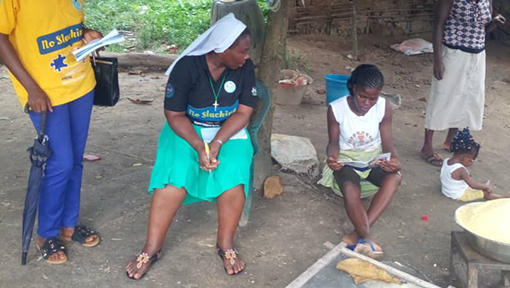
With a social mobilizer, Normakoh even went to a nearby village to provide family planning information and services. Given that she was less familiar with this village, she brought only pills and injectables. She shares how thrilling this visit was:
For the first time since I had been in my health facility, I gave out up to 28 cycles of oral pills [in this one day]. Yes, because I went with it into the field. And, as we were talking, women would say ‘Sister, we would come oh but I can’t follow you today.’ So, I did the pregnancy test since they are free. And, I gave them the pills and I said ‘Okay, by the end of this pill [pack], I will be in the health center. So, you now come and change the method if you want to change. If you want to continue too, no problem.”
In addition, Normakoh shared how through TCI-supported whole-site orientation, she has been able to convince her colleagues to become family planning champions and providers:
Even right in the facility, my fellow health workers would fight against it [family planning]. My male health workers thought it would make their wives promiscuous and all that. But now they join me to talk about family planning. They now think it is not just a sister thing any longer. It’s something that everyone should be talking about. And, then one of the social mobilizers is a family planning client. So, when we go out to talk, she shows them her arm and tells them, ‘I am on it too. If it is something bad, I will not take.’ This has really increased turnout for services.”
With enthusiasm, Normakoh explains how all this improved her ability to provide contraceptive services, particularly to young people:
If one goes through my record, goes through my data, you see that in most cases I don’t have elderly people on my data. I have young girls; some of them as young as secondary school. Those who take the IUD – most of them are either just finishing school or still in school between the ages of 17 and 24. So it’s hugely satisfying and important to me because it gives these girls the opportunity to finish their schooling. Most of the time, in years back, by the time they reach 17 or 18, they’d become pregnant. So, when I see them now coming to pick up methods of family planning, I feel delighted because those who take up the implant or IUD will be able to successfully finish their secondary schools without becoming pregnant. Secondly, I have witnessed cases where there have been lots of abortions. In years past, most of these women were coming in bleeding, indicating that they have tampered with their pregnancies and that was because they had not accepted methods of family planning. But recently, those women when they come to the health center, some of them are like ‘Sister, thank you oh. We thought you were just talking when you initially spoke with us about family planning, but now we are really really seeing changes.'”
As a result of these efforts, the LGA recorded a significant uptake in family planning services during the month of August 2020 and beyond compared to preceding months.

A 56% increase in client volume with 851 more clients from the baseline (12 Mo- January 2020). The blue arrow represents the start of the intervention. Source: DHIS 2

